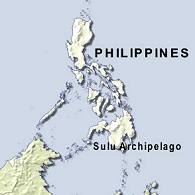2007年VOA标准英语-Southern Philippine Island Plays Out Drama in W
搜索关注在线英语听力室公众号:tingroom,领取免费英语资料大礼包。
(单词翻译)
By Douglas BakshianJolo
22 February 2007
Far from the headlines and the rest of the world a drama in the global war on terror is playing out on Jolo island in the southern Philippines. A Muslim guerrilla group called Abu Sayyaf is on the run from the Philippine military while U.S. water, road, and health projects are making life better for the people. But is it yet time to declare victory? Douglas Bakshian recently traveled to Jolo for a look at things.
There is much talk these days in Philippine and U.S. military circles about winning the war on terror on Jolo island, and ending a long struggle against the Abu Sayyaf Islamic terrorist group.

Philippines map showing Sulu region where Jolo is located
Years of fighting the guerrillas failed to produce peace. So the Philippine military, with the help of U.S. advisers1, began addressing civilian2 needs - roads, schools, water systems and medical care.
By alleviating3 some of the desperate poverty on Jolo, the military defused some of the anger and frustration4 that fuels violent movements.
General Juancho Sabban, commander of the Philippines Marines who are in the forefront of the operation, says this is all about winning public support.
"The secret of all these operations should be the people," he said. "If you win the people, you win the war."
The Abu Sayyaf is one of several groups that over the past 30 years have fought to create a Muslim homeland in the southern Philippines, a predominately Christian5 country. The government has negotiated peace deals or ceasefires with the two dominant6 militant7 forces.
Unlike other separatist groups, the Abu Sayyaf has become best known for a series of deadly bombings and brutal8 kidnappings and murders.
Since 2002, American special forces have provided training, analysis and intelligence to the Philippine military in the fight against the Abu Sayyaf. U.S. Navy Commander James Marvin helps lead the joint9 task force for the operation. He says the goal is to build confidence in the people that the military is a good thing and to drive a wedge between the terrorists and the people.
"Basically, you take the bullies10 that are on the playground and you get all the kids on the playground to stick up for themselves, and tell the bullies, 'we don't want you here anymore.' And they are no longer bullies, they cannot function in that capacity and they move," he said.
At the same time, the Philippine military focused its combat effort on smaller patrols conducting intelligence-driven operations that target terrorist leaders. It also adopted guerrilla tactics to fight in the dense11 jungles of Jolo.
As a result, in recent months, several Abu Sayyaf leaders have been killed, and their followers12 driven into the hills.
But will this mixture of the missionary13 approach and the iron fist be enough to eradicate14 a problem that was decades in the making?
General Sabban says he thinks the Abu Sayyaf leaders will fight to the death.
Radullan Sahiron, in his 70's is the main senior leader left. Sahiron's son, Ismin, was killed in a clash with the military last year. But before he died the general spoke15 with him by cell phone.
"And I was trying to convince him to come down and live a normal life, go back to the mainstream," he said. "But he said 'we have an ideology16 that we are fighting for. I'm sorry, we really want to establish an Islamic state.' And then I told him, 'How about your father?' He said, 'my father will die here in Patikul [a Jolo area], fighting. It's either you get out of Sulu, or my father dies here.'"
Some political analysts17 say the Abu Sayyaf can be wiped out, but that is not enough to bring lasting18 peace to Jolo. Ramon Casiple, head of Manila's Institute of Political and Electoral Reforms, says the problems that fostered the group's rise must be addressed.
"But if you are asking me if the factors that give rise to Abu Sayyaf have been eliminated, and therefore in the future will there be more Abu Sayyaf? I think these factors have not been eradicated19 even with all the civic20 action that has been done already," he said.
Sulu province, which includes Jolo, is one of the poorest regions in the Philippines. It has suffered neglect by the central government and long-standing grievances21 have powered successive rebellions.
It also has a rigid22 hierarchical social structure with a few wealthy families at the top and dozens of clans23. Casiple says previous development programs in the region have failed because only certain families or groups benefited.
"There are certain sections that have been getting wealthier from all the aid. But the farmer at the bottom level has not improved," he said. "That is the breeding ground of rebellion. I mean you can have a road, but if the family doesn't have a car or a vehicle to use it, it is nothing for them."
For all this to be untangled after so many decades of neglect will require a lot of work, and a fundamental and sustained change in Jolo's economic, social and political structures. More importantly, analysts say, Manila must shift from a policy of neglect to a serious commitment to better the lives of all Jolo's people.
 收听单词发音
收听单词发音 




